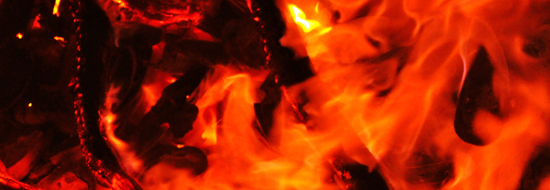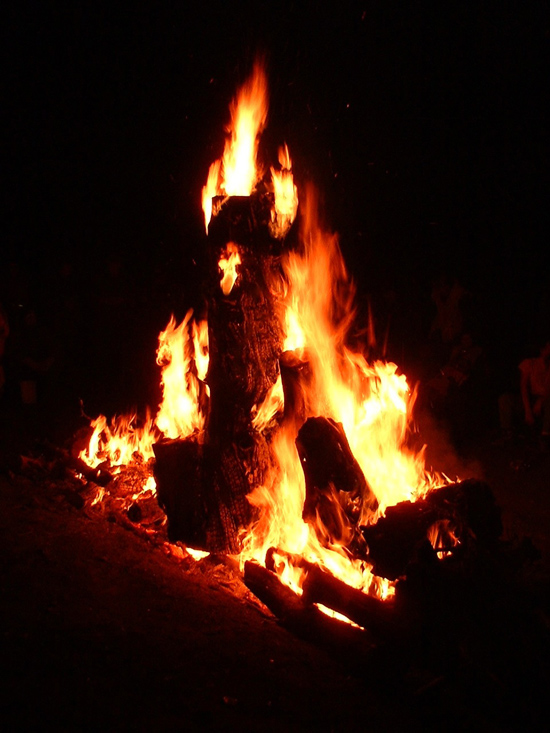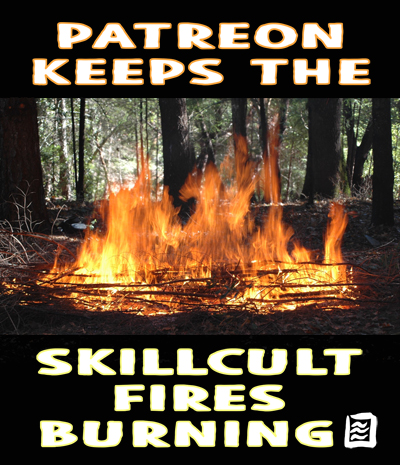 One night at Glass Buttes Oregon (or day, or something in between), I was sitting by a fire with Tamara, Margaret Mathewson and Jim Riggs. I’m sure there were other people there too, but I remember those guys for sure. The fire, and how it was or wasn’t being managed, was a common topic in those days. All of us were inclined to be geeky about fire, and we all used it enough to have a strong working knowledge. We were observant and critical when someone added wood or adjusted the fire. As fire enthusiasts, that kind of geekery was our idea of fun, but it was also serious to us. Like if you put a bunch of chefs together and they’d be eyeing each other cooking and saying like “dude, that’s too much anchovy” and stuff like that. It was all good humored, but this wasn’t just “lets geek out and be funny and nerdy”, it’s what we did. And if you do something a lot and are good at it, you care, you notice details and you develop opinions. None of us wanted to sit around in the smoke, or be cold, so the fire should be done right. It was the focus of camp life and not to be accepted in just any old state that it happened to be found in. Fire does not tend itself all that well, and tending is a matter in which attention to detail yields great returns in results. Inattention, on the other hand, generally leads to discomfort, annoyance, cold food, burnt food, tearing eyes, cold butts or moving of chairs closer and farther from the fire.
So anyway, we were all sitting around flicking each other crap about where the wood should be put and how, and what about that smoking end there, or Jim with his “upward focus” and me with my parallel fuels, and fire chess was born. Someone was probably like Ok, that’s fine I guess, but If you do it this way that smoking end is dealt with. And someone else was like hey, it’s my turn, and eventually it coalesced into a set of simple rules. Each person gets a turn in rounds to either add a piece of fuel, or make one adjustment. After each move everyone else analyzes the move and makes comments. We thought that was fun for a while and used to play it occasionally when nothing else was going on and we were sitting around the fire, which was fairly often.
One night at Glass Buttes Oregon (or day, or something in between), I was sitting by a fire with Tamara, Margaret Mathewson and Jim Riggs. I’m sure there were other people there too, but I remember those guys for sure. The fire, and how it was or wasn’t being managed, was a common topic in those days. All of us were inclined to be geeky about fire, and we all used it enough to have a strong working knowledge. We were observant and critical when someone added wood or adjusted the fire. As fire enthusiasts, that kind of geekery was our idea of fun, but it was also serious to us. Like if you put a bunch of chefs together and they’d be eyeing each other cooking and saying like “dude, that’s too much anchovy” and stuff like that. It was all good humored, but this wasn’t just “lets geek out and be funny and nerdy”, it’s what we did. And if you do something a lot and are good at it, you care, you notice details and you develop opinions. None of us wanted to sit around in the smoke, or be cold, so the fire should be done right. It was the focus of camp life and not to be accepted in just any old state that it happened to be found in. Fire does not tend itself all that well, and tending is a matter in which attention to detail yields great returns in results. Inattention, on the other hand, generally leads to discomfort, annoyance, cold food, burnt food, tearing eyes, cold butts or moving of chairs closer and farther from the fire.
So anyway, we were all sitting around flicking each other crap about where the wood should be put and how, and what about that smoking end there, or Jim with his “upward focus” and me with my parallel fuels, and fire chess was born. Someone was probably like Ok, that’s fine I guess, but If you do it this way that smoking end is dealt with. And someone else was like hey, it’s my turn, and eventually it coalesced into a set of simple rules. Each person gets a turn in rounds to either add a piece of fuel, or make one adjustment. After each move everyone else analyzes the move and makes comments. We thought that was fun for a while and used to play it occasionally when nothing else was going on and we were sitting around the fire, which was fairly often.
What I noticed though was that when new people unversed in the ways of fire tending were around, they picked up a great deal of understanding extremely fast. So Tamara and I started using fire chess in classes, and sure enough, people went from fire losers to fire cruisers in no time. Most people haven’t grown up around open fires and don’t understand how to manage them to desired ends. Further, it often seems that it barely occurs to them that management of the fire beyond tossing some wood on every once in a while is worthwhile at all! That’s Ok, we all have to start somewhere and we are what we do. One of the first campfires I had to start on my own, I used an entire candle's worth of wax, dripping and relighting to get it to finally start burning. I had damp wood to work with, and I just did not understand how the system worked. It was somewhat sobering just how lame I was in that capacity, and I started paying attention. I soon put myself in the position of needing fire everyday for cooking and various other things, so I was forced to perform, but it was a gradual process. I believe that fire chess works to quickly foster an understanding of fire starting and management for two basic reasons.
The first reason is that there are frequent and specific opportunities created for comment and feedback. Feedback from both instructor/mentors and from other participants is frequent, but it is tied directly to actual results and occurrences second by second. Fire reacts quickly in many cases providing dramatic lessons in a short period of time. The results, positive or negative are visual and often immediate.
The second reason, and maybe the most important, is that participants are invested in the results. They are paying close attention because someone might screw up their move, or make the move they are planning. If someone does something that works well it’s noticed and commented on, which drives the point home so it sticks. When the players turn comes they can build on what has gone before and they want to do well in the eyes of the group.
A few tips for instructors
*Start with a short discussion about the four elements of fire- heat, air, fuel and the relations and interdependence of those 3 tangible elements. The less tangible fourth element of fire, how heat, air and fuel are in relation to one another, is what fire use and management are all about, so drive that home. Upcoming posts should deal with that subject in depth.
*next a short discussion asking “what makes a good fire?” This opens the mind and leads inevitably to the conclusion that there is no one good fire and that fires are managed for different uses. Sometimes we want just smoke and no flame, and sometimes we want no smoke at all, more heat, less heat, different shapes, etc... You can still play the game as if you want no smoke and to be comfortably warm. The understanding gained by playing for a clean fire is the most generally useful and can ultimately foster understanding of the management of other types of fires as well.
*It’s not “all good”. Sometime in the 60’s or 70’s criticism became uncool, everyone was doing their best and everyone got an A for effort. The good and relevant points which began as that message are largely lost and the residue we are left with is a dogma that can hamper achievement. Be critical. Don’t be mean, that’s not constructive and it’s not the point. Critical and mean are not the same hat. If you have opinions, let them out and encourage others to do so as well (and don't use upspeaking when you do it!). Constructive discourse requires analysis of information, formation of ideas and opinions, and expression of those opinions, along with the open consideration of the opinions of others. It can be argued that everyone is doing their best under the circumstances, but the circumstances can change and constructive criticism can be an important part of that evolution. Don’t be stingy with praise either. Positive reinforcement works.
*If you are the teacher and think you know what you’re doing, stand back a little and let people learn at a comfortable pace. You might be surprised how little prompting is required by you. As long as basic goals are understood and held in common, progress can be rapid even with people totally unfamiliar with fire tending.
*Start small since fires grow fast when constantly fed.
*Sized and types of fuel are as important as placement and maintenance, so have a mix of fuel types and sizes. Dense long burning woods, dense fast burning woods, light fast burning woods, woods that throw sparks, woods that don’t throw sparks, woods that tend to smolder, woods that make long lasting coals, some bark, some leaves, etc... Fuel type is important and having all types of wood will open windows for education.
*Mix all the woods together in a pile. Throw in some inappropriate wood. Nothing toxic, but a few chunks of pitch wood, some very punky wood and some green wood could be instructive. Very few novices will notice that wood is green, but the seasoned will usually notice at first heft.
*Don't allot much time for fire chess, because it doesn't take long, and the fire will just get too large pretty fast.
What started as a natural pass time among fire nerds, developed into an effective learning tool. Fire chess, in spite of the name and the critical element of the game, is not very competitive. Everyone has the same goal, so cooperation is more common than competition. If anything the competition is with the self, to understand more and function better. For people who teach long term classes in outdoor living, you’ll find that after just a game or two of fire chess, the campfires will be managed much better for the duration of your time together. It is also a good item to throw in a one day class about fire. Lessons learned are not limited to tending fires, but lend an understanding of the function of fire generally, including the important skills of starting them and putting them out.





